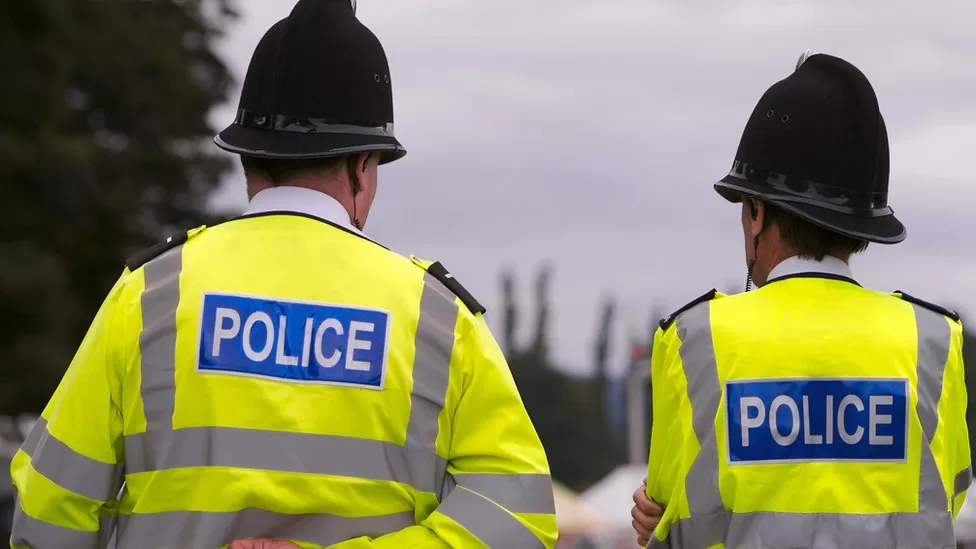Time is running out if the police and the government are to restore public trust in policing, the Chief Inspector of Constabulary has warned.
In his annual report, Andy Cooke said police forces were experiencing “one of their biggest crises in living memory”.
“Atrocious” crimes committed by serving police officers had fuelled distrust, while too few criminals were being caught, he added.
Mr Cooke has called for new powers to enforce improvements.
In his annual assessment of policing in England and Wales, Mr Cooke’s first since his appointment last year, he said police were failing to keep up with rising demand from the public and too often were not doing the basics right.
‘Strained’
Charge rates had fallen by two-thirds since 2014, the report stated, while victims were increasingly dissatisfied with the police and wider criminal justice system.
“I can’t recall a time when the relationship between the police and the public was more strained than it is now,” Mr Cooke said.
“The public expectation of policing is that they prevent crime, they investigate crime properly, that they’re in the communities, they’re visible, that they answer 999 calls quickly. These are all the basics of policing.
“We’ve seen too many occasions where opportunities are being missed to catch offenders who are causing misery in our communities.”
Mr Cooke says the police are often “picking up the slack” for other parts of public services.
“Mental health is a great example,” he said. “Last year policing attended 600,000 mental health incidents. Most of those incidents there was no requirement for police to attend.”
Metropolitan Police Commissioner Sir Mark Rowley wrote to health and social care services in Greater London in May, informing them the service would stop attending mental health incidents from September, except where there is an “immediate threat to life”.
Humberside Police introduced the Right Care, Right Person scheme in 2020 to ensure mental health calls are dealt with by relevant professionals.
Police attend every home burglary scene, says NPCC
Police initiative to tackle racism accused of being racist
How did the government meet its police pledge?
Mr Cooke welcomed investment that had seen more than 20,000 police officers added in England and Wales since 2020.
However, he noted difficulties in vetting new recruits and the inexperience of a workforce which lost many established officers during David Cameron’s time as prime minister.
Furthermore, where failings have been identified, some forces have been too slow to implement improvements, he said.
Mr Cooke called on Home Secretary Suella Braverman to grant new enforcement powers to enforce compliance with the Inspectorate of Constabulary’s recommendations by the end of this year.
‘Horrendous acts’
Forces had taken too long to respond to recommendations in the 2016 State of Policing report relating to officers abusing their positions for sexual purposes, he said.
“Two forces did from the start what they should have done,” Mr Cooke said. “That should have been 43 forces.
“In those seven years, we have seen some truly horrendous acts by officers.
“The chances of these things happening would have been lessened had we had those powers at an earlier time.
“It would ensure police chiefs across the country would have to make the changes that are required to keep the public safe.”
‘Totally dysfunctional’
Labour shadow home secretary Yvette Cooper called the report “truly damning” and backed major reforms. She blamed successive Conservative home secretaries for a series of failings.
“These include systemic failings in policing and a totally dysfunctional criminal justice system, with more criminals getting away with crimes, victims let down, vital neighbourhood policing devastated, record numbers of forces in special measures, and confidence in policing falling,” she said.
Ms Braverman said the report acknowledged a fall in crime rates but conceded “there is lots more to do”.
She added: “This is why I’ve been calling for common-sense policing. With the highest number of police officers than ever before, the police must deliver for victims.
“It has always been my priority to reduce burdens on policing and ensure they have the resources they need.”
Baroness Louise Casey, who authored a damning report on the Met earlier this year, told the BBC’s Political Thinking podcast that for people to consent to policing, officers need to be seen as “beyond reproach” on issues like violence against women.
She said: “The thing I still feel is fairly unforgivable is that misconduct in a police officer is totally undermining of the fact that they can arrest me, they can cuff me, they can strip search me, they can literally take my clothes off and strip search me.
“They can put me in a police cell for 24 hours, all on the basis of that officer’s word.”
Source:bbc
In other news- The Kardashians reveal which sister removed herself from the family group chat amid ‘feud’
The Kardashians have bared all in front of the cameras for almost two decades but behind the scenes, one sister seemingly doesn’t want to be in constant communication.
Rumours of a family feud continue to circulate among the Kardashian-Jenner clan, but it appears as though one of the famous brood has had enough. Read more
